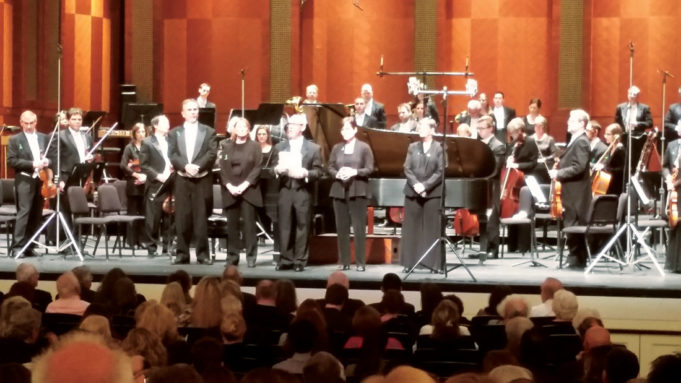Like many of their colleagues nationwide, Fort Worth Symphony Orchestra musicians would rather forget 2010. That was when they took a 13.5 percent pay cut to shore up an $819,000 loss in revenue. The nation was reeling from the effects of a recession, and corporate and private donors were cutting back on gifts.
For the musicians, it was a temporary setback.
Or so they thought.
Now the stock market is showing record profits, unemployment in Texas is at 4.2 percent, and the region is experiencing record growth. Arts contributions, according to a recent study by Giving USA, reached an all-time high last year of $17.2 billion. But while similar-sized orchestras have rebounded since the recession — 20 medium to large ones exceeded fundraising and/or ticket sales goals last year, according to the same study — FWSO musicians are being asked to take it on the chin again.
In July, FWSO musicians –– through their union, the Dallas/Fort Worth Professional Musicians Association –– began negotiations for a new three-year contract with management. FWSO president and CEO Amy Adkins, with the approval of the nonprofit’s board of directors, proposed cutting the concert season from 46 weeks to 43, decreasing artist fees for the Concerts in the Garden series by 25 percent, and eliminating three weeks of paid time off. The loss in wages would mean a nearly 23 percent loss in salary since 2010 once inflation is accounted for.
The musicians union had hoped for a partial restoration of lost wages from 2010.
Since the previous contract expired in July, FWSO musicians have been in limbo, where they will remain until a new contract is agreed upon.
Adkins did not respond to interview requests by the Fort Worth Weekly, but in a recent story by the Fort Worth Star-Telegram, she said she and her employees have been actively fundraising.
“My staff and I focus on dozens of fundraising efforts throughout the entire season,” she said. “Our approach is targeted and ongoing, and we are raising money every single day. Last season, we succeeded in raising $5.2 million from generous individuals, companies, and foundations. This was $300,000 more than the previous season. The results speak for themselves, and I am proud of what we have accomplished.”
Even with those figures, she told Star-Telegram that a projected budget shortfall of $200,000 to $458,000 necessitated a pay decrease for musicians. Unlike most major orchestras, the performing arts group does not carry a line of credit to cover short-term deficits. FWSO leadership argued that cuts in corporate donations, recent Bass Hall rental rate increases, and a lingering shortfall in ticket sales were at fault. Ticket sales, Adkins said, are on the rise but are still $200,000 less than seven years ago.

Union president Ken Krause isn’t buying it.
“The symphony management said they can’t raise the funds,” he told the Weekly. “Fort Worth is one of the fastest-growing cities in the country, so why is [the orchestra management] shrinking the budget?”
Though FWSO did not respond to requests by the Weekly to verify the numbers, Krause said ticket sales are up 13 percent and that subscriptions are up five percent from last year.
Symphony management recently hired a fundraising director, Rebecca Owen, but FWSO violist and musician spokesperson Scott Jessup said his fellow musicians have seen inconsistent fundraising efforts at best and no long-term development planning from administration.
Jessup claims that in one day, North Texas Giving Day (September 17), the Dallas Symphony Orchestra raised about $135,000.
By contrast, the FWSO raised $34,315.
“If an orchestra right next door, with the right effort and focus, can raise that much money in one day, why wasn’t there more effort on our part?” he said.
Jessup said all that he and his comrades received was “one Facebook post.” (A quick look at the orchestra’s page reveals two, however.)
“These are things that don’t cost a lot of money to implement, and yet we missed the opportunity,” he said. “The orchestra had high hopes when Adkins took over as president, but the intervening time has been disappointing.”
Orchestra members are responding with a “Growth not Cuts” campaign. In front and inside Bass Performance Hall, they are handing out flyers and green bracelets emblazoned with fwsomusicians.com.
The gilded performance space where the musicians are building awareness for their cause leads to uncomfortable questions, Krause said.
“We have a beautiful building to perform in,” he said. “That can be taken care of, so why not the things that go on within the building?”
Krause declined to comment on fundraising shortcomings within symphony management, but one FWSO musician who asked not to be named pointed to several frustrating obstacles. One of the biggest has to do with Mercedes Bass’ hectic schedule. The ex-wife of mega-investor Sid Bass is FWSO board chairperson, but she’s also vice chairperson of the board of Carnegie Hall and managing director of the board for the Metropolitan Opera. Both gigs are pretty high profile and demand a lot of her time, the musician said.
And then there are the high rental costs for Fort Worth’s orchestra, which are proportionally a small part of the arts group’s budget but significant. Those costs totaled $269,300 in 2013, according to an audited report released by the symphony. By comparison, Dallas Symphony Orchestra management pays one dollar a year (not a misprint) for the use of the world-renowned Morton H. Meyerson Symphony Center.
Meyerson general manager Les Studdard told the Weekly that part of the generous agreement is due to the fact that DSO musicians did the majority of fundraising to build the Dallas hall in the late 1980s. The Dallas Office of Cultural Affairs pays for the majority of staffing and upkeep at the Meyerson. Outside groups renting the hall must pay, however.
Whereas the Dallas hall is owned and managed by the city, Bass Hall is run by Performing Arts Fort Worth, a low-profile nonprofit that has an annual budget of $14 million and brings in large popular acts. One FWSO musician told the Weekly that large cost savings could be attained if the four resident arts groups (FWSO, Fort Worth Opera, Texas Ballet Theater, and the Van Cliburn Foundation) were allowed to manage the hall directly.
Performing Arts Fort Worth did not respond to requests for records of past rental rate hikes, but in an e-mailed statement, PAFW president and CEO Dione Kennedy said the daily rental rate for Bass Hall increased by $250 recently.
“The rental rates had remained unchanged since July 1, 2013,” she added. “To offset this increase, there has been a reduction in other fees associated with usage of Bass Performance Hall.”
Krause said there’s no talk of striking in the immediate future. He hopes to find a fair settlement for the sake of the city as well as FWSO musicians.
During a recent concert, Jessup stood alongside orchestra members and addressed the audience from onstage, a significant first for the musos.
“We are your orchestra,” he said. “We live in your neighborhoods. We attend your houses of worship, and we teach your children. Now, our president and board want to cut our salaries. We ask you to stand with us to show our management that these musicians, and this city, deserve a world-class orchestra with a vision for our future that promotes growth.”
Most of the concertgoers seemed shocked. But after a brief pause, they rose to their feet and applauded as the musicians returned to their seats and set up instruments for the evening concert.
The next round of talks is set to take place on Tuesday, Nov. 3, in the Maddox-Muse Building downtown.













I have listened for this “brief pause” in the recordings of the musicians’ speech on YouTube.
There isn’t one. The speaker (Scott Jessup) concludes with “Thank you so much for your continued support!” and the audience jumps right in, pretty noisily.
As far as the “North Texas Giving Day”…sure. One of those Facebook posts was ON Giving Day itself, as anyone can see. That is not so much an example of “targeted and ongoing” fundraising but rather halfhearted, it seems to me. I believe it’s been mentioned that many Fort Worth nonprofits outdid the FWSO, even the Feral Cat Society.
Instead of getting their feelings hurt, management should be truly shouldering their burden and improving their own effectiveness, instead of punishing the musicians.